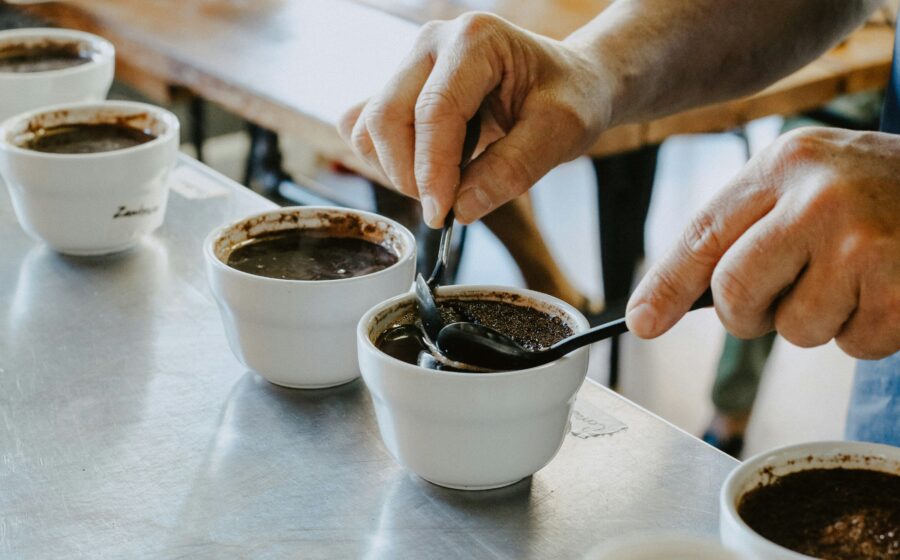Just days before thousands of coffee pros gathered in Houston for the Specialty Coffee Association’s (SCA) annual Expo, the organization announced it would be taking over management of the Q Grader Program from the Coffee Quality Institute (CQI).
The Q Grader certification is a rigorous professional training program that helps coffee pros build the sensory skills necessary to evaluate and assess coffee quality. For thousands of coffee professionals, the Q, as it is colloquially known, streamlines communication between different parts of the coffee supply chain, and across languages.
The SCA and the CQI referred to the deal as a “historic partnership.” According to a press release, the SCA will “evolve the content” of the Q Program to “provide better support and more accessible educational opportunities to the coffee industry.” The certification will now be based on the Coffee Value Assessment (CVA), the SCA’s updated cupping standards, which expand coffee evaluation beyond a single 100-point score.
The announcement took many in the coffee industry by surprise. Thousands of certified Q Graders around the world learned that, once their current licenses expire, they will need to take the new Evolved Q Grader Program exam to stay certified.
Emotions ran high in the wake of the announcement, and responses from across the supply chain were polarized. The comments section on the SCA’s Instagram post quickly filled up with Q Graders expressing shock and dismay at the changes.
Since the news dropped in April, the SCA has made some additional announcements. As part of its push to encourage wider usage of the CVA, it agreed new partnerships with the Colombian Coffee Growers Federation (FNC), the Brazil Specialty Coffee Association (BSCA), and the Specialty Coffee Association of Indonesia (SCAI) to integrate the cupping standards within the three organizations. Just last week, it announced a new tiered pricing structure for its education programs, with costs varying depending on the student’s country.
Less than a month after the initial story dropped, many are wondering what the SCA’s takeover of the Q Program means for the industry. We spoke to actors across the supply chain to get some answers.
Anatomy of an Announcement
Discussions between the SCA and CQI over the direction of the Q Program have been ongoing for more than two years. As Nick Brown reported for Daily Coffee News, there have been “competitive tensions” between the two organizations since at least 2022. CQI CEO Michael Sheridan told Brown that they have been working “over the last year to reestablish dialogue and build some goodwill.”
Brown reported that the deal included a 10-year licensing agreement for the Q Program, for which the SCA will pay an annual fee of $250,000, plus a donation of “5% of its education programming revenue to a fund to support CQI’s international development work.”
The SCA has been working to develop and launch the CVA since at least April 2023, when it published a white paper reappraising the role and impact of coffee tasters within the industry. The paper called for an expanded understanding of the role, emphasizing that professional cuppers have evolved to both evaluate quality and communicate value to the end consumer.
Soon after, it launched a beta test of the CVA, and formally adopted the standard in November 2024 to replace the previously ubiquitous cupping protocol and form. The 2004 form, as it was widely known, allowed users to evaluate a coffee and give it a score out of 100. By contrast, the CVA aims to give a more comprehensive indication of a coffee’s value than that relatively limited 100-point scale, combining detailed sensorial attributes with more subjective elements, such as the taster’s personal preferences.
Uptake of the CVA, as Brown reported, has so far not been widespread. However, its use as the basis of the evolved Q Program, as well as the SCA’s recent agreements with the FNC, SCAI, and BSCA, should increase adoption across the industry.
The New Q
Many coffee professionals will be impacted by the change. There are more than 100 Q instructors around the world, many of whom make their living from teaching the program. They have taught nearly 10,000 Q Arabica Graders in more than 100 countries, from Afghanistan to Zimbabwe.
Becoming a certified Q Grader involves an intensive six-day course, including 20 exams over nine modules. The certification can cost thousands of dollars, and if you fail the first time (which many do), it costs even more.
Part of the push by the SCA is to make certifications more affordable: “The SCA has created lots of options for [Q Graders] to integrate CVA into their expertise easily and inexpensively,” the SCA said in an email response. Last week, the organization announced a new tiered pricing model, which means the costs for its education programs will vary by country.
Earning the new Evolved Q Grader license, as the SCA refers to it, will involve learning “practical techniques in sensory evaluation, green coffee defect identification, and quality control in a robust, research-informed curriculum.” Current Q Graders will keep their status until their certificates expire, and are eligible for a fast-track course to earn the Evolved license.
Reactions: Surprise, Confusion, Frustration—and Hope?
The news took many in the industry by surprise. “My initial reaction was heartbreak,” says Traci Armstrong, a Q instructor based in South Carolina. “Even though I did not have any details around the news, I knew it ultimately meant the end of the Q as we know it. As a newish instructor of only two years, I felt like my prior years of striving for this goal to reach the coveted Q instructor status had been in vain.”
Shaun Ong is a consultant and Q instructor in Singapore who works with clients across the supply chain, and has been implementing the new model into his education business. As a CVA Ambassador, Ong was an early adopter of the updated standards, and has been in touch with both fellow instructors and clients to gauge their reaction to the news.
“There’s a lot of people in the industry that are very shocked right now, but it is important to highlight that there’s a spectrum of people,” Ong says. “On one end of the spectrum are people that are not affected, and on the other end are people that are terribly, terribly affected. We are talking about career loss.”
Ruth Ann Church, a Q Grader and founder of Artisan Coffee Imports in Michigan, says the Q system in its current form benefits the coffee industry. “I think the rigor of the Q Grader serves a purpose for helping us have some credible language, a language that our industry speaks today,” she says.
This view is echoed by Nico Herr, COO of exporter Mountain Harvest Coffee in Uganda, who notes how essential Q Graders are to communicating coffee’s complexity across countries and languages. “Together, we developed a rhythm—a global lexicon of what ‘quality’ means,” she says. “The Q was our common language. It gave us a place to begin. Now that shared language has been taken away.”
Church also points to the ubiquity of the 100-point score in the way quality is communicated to customers: “Even Whole Foods, in their little blurb on the back of the coffee bag, is explaining to consumers that there is a 100-point scale, and assuring them that their coffee is in this specialty coffee range that is above 80. That’s how pervasive the Q Grader is.”
Now, she says, that has been thrown away. “It’s biblical proportions, right? This is the Tower of Babel. The SCA is going to, single-handedly, make it so the entire specialty coffee world that could speak a single language can no longer communicate.”
Others are more sanguine. “My initial reaction was a mix of confusion and frustration, but also curiosity and reflection,” says Camila Khalifé, a coffee quality specialist and CQI instructor based in Ecuador. “I think it’s long overdue that we rethink who gets access to knowledge, credentials, and teaching roles in coffee education. So while I have some reservations about how this change is being handled, I also see potential in evolving toward a more inclusive and accessible system.”
The SCA responded to questions via email and said the organization has received “a tremendous amount of positive response from our announcement, particularly from those who have historically felt excluded from the Q due to its expense and exclusivity. They are excited by the possibility of a more accessible evolved Q, which SCA has committed to deliver. We hope they hold us accountable to this commitment.”
What Does the Future Hold?
Beginning October 1, 2025, CQI will no longer be part of the Q Program, and management will pass to the SCA. This, the SCA says, “allows CQI to focus on its core mission—producer-side development—and allows SCA to integrate the Q into our wider education mission.”
With the FNC, SCAI, and BSCA striking deals to incorporate the CVA into their operations, it’s likely that adoption of the Evolved Q will continue to grow. Ong and others are already hosting CVA classes in anticipation of the switch. For Armstrong, who wishes to continue in coffee education, the Evolved Q is a means to an end, and she says she will take the fast-track course. At the same time, she says, “I will likely continue to develop my own curriculum that can be offered at an affordable price and explore what the folks in my community want to learn.”
Khalifé thinks the current moment is a good opportunity to pause and reflect. “While I believe the CVA still has a long way to go, with absolutely needed improvements and considerations, at least it feels [like] a more accessible system for people from different backgrounds and adaptable to coffees with different characteristics,” she says.
“Much of the perceived value of the Q came from how exclusive and difficult it was to access,” she continues, “so if the new system can be more inclusive without compromising rigor, and if it includes the perspectives and expertise of professionals from producing regions, I am definitely curious to see where it takes us.”









